Politics
Workers poorer now, despite pay increases — Oshiomhole
Published
3 months agoon
By
Ekwutos BlogWorkers poorer now, despite pay increases — Oshiomhole
By Luminous Jannamike
ABUJA—Former governor of Edo State, Comrade Adams Oshiomhole, has criticised wage exploitation in Nigeria, warning that poor compensation negatively affects national security and economic productivity.
Speaking at the Distinguished Personality Lecture organised by the National Institute for Security Studies, NISS, in Abuja yesterday, Oshiomhole highlighted how inadequate wages create a cycle of economic hardship, making workers vulnerable to manipulation and radicalization.
The lecture, titled “National Minimum Wage: Reward System and Productivity in Africa,” was part of the Executive Intelligence Management Course, EIMC 17, aimed at fostering a deeper understanding of the relationship among wages, security and productivity
Oshiomhole argued that fair wages were essential to boost workers’ motivation, efficiency, and overall economic growth.
The former Edo governor, now senator, representing Edo North senatorial district in the National Assembly, said: “Workers face fluctuating salaries and job insecurity, as employers can easily hire and fire employees.
“Despite paying union dues, workers often receive minimal support from trade unions, leading to questioning their effectiveness.
“Historically, the right to organise was suppressed, which limited workers’ ability to negotiate collectively. Industrial sabotage emerged as a form of protest against poor conditions.
“Collective bargaining and the right to strike are essential tools for negotiating fair wages and working conditions. Workers often resort to ‘work to rule’ when rights are restricted.
“Significant disparities exist between minimum and maximum wages across sectors, leading to dissatisfaction among workers. The wealthy often benefit from state protection, while the poor struggle.
“The minimum wage is designed to protect vulnerable workers but is often not enforced. Setting minimum wages too high can risk job losses while setting them too low can lead to exploitation.
Related News
“Inflation severely impacts purchasing power, making it difficult for workers to maintain a decent standard of living. Historical comparisons show that many workers are poorer now than in the past, despite nominal wage increases.”
The Director-General of the Department of State Services, DSS, Adeola Ajayi, echoed Oshiomhole’s concerns, noting that better wages reduce workers’ vulnerability to abuse and promote national stability.
In his remarks, Joseph Odama, Commandant of NISS, lauded Oshiomhole’s long-standing commitment to labour advocacy, emphasizing the importance of fair wages in ensuring sustainable development.
He said: “The national minimum wage is a pressing issue in our economic discourse today, affecting millions of Nigerians and influencing both individual lives and national productivity.
“A well-designed reward system can drive worker motivation, improve efficiency, and promote economic growth, while poorly structured policies can demoralize the workforce.
“To aim for a more equitable society, it is essential to understand the complex relationship between wages, rewards, and productivity.”
You may like


Abia Govt Begins Major Crackdown On Street Trading, Road Obstructions In Aba


Globacom CEO Ahmad Farroukh resigns after one month amid governance challenges
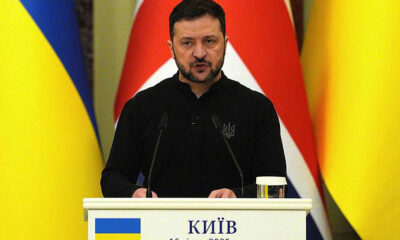

Zelensky dampens hopes Trump could strike peace deal with Putin


Trump orders ‘blackout’ at CDC, FDA, NIH as agencies prepare for MAGA


“I know you’re stubborn, but let it go” – Blessing CEO goes on her knees to advise Speed Darlington after regaining freedom (Video)


Residents Rush To Scoop Groundnut Oil As Another Tanker Overturns In Niger, Three Days After 98 Were Killed In Explosion.
Politics
Zelensky dampens hopes Trump could strike peace deal with Putin
Published
16 hours agoon
January 22, 2025By
Ekwutos Blog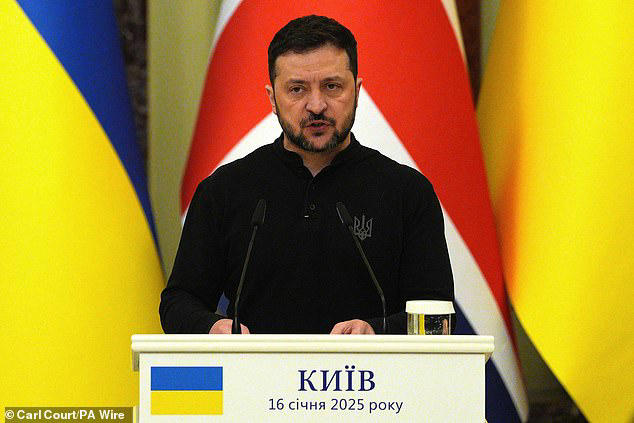
Volodymyr Zelensky has insisted that Ukraine will never recognise occupied Ukrainian territories as being part of Russia, even if pressured to do so by allies, dampening hopes that Donald Trump may be able to strike a peace deal.
‘No matter what anyone wants, even if all the allies in the world unite, we will never recognise the occupied territories [as part of Russia]. This is impossible,’ the Ukrainian president emphasised.
‘We will not legally recognise them. For us, they will always remain occupied territories until we liberate them.’
Trump, who took office for a second term on Monday and was last in power before Russia launched its full-scale invasion of Ukraine, has repeatedly said he could end the war swiftly, without specifying how.
His newly-appointed Secretary of State Marco Rubio said on Tuesday that ending the war was a priority for the president, but would only be possible if both sides make significant concessions.
‘Anytime you bring an end to a conflict between two sides, neither of whom can achieve their maximum goals, each side is going to have to give up something,’ he told CNN, adding that ultimately the decision would be down to the Ukrainians and Russians.
It comes after Russian Deputy Foreign Minister Sergei Ryabkov said today that Moscow sees a small window of opportunity to forge agreements with the new US administration.
‘We cannot say anything today about the degree of the incoming administration’s capacity to negotiate, but still, compared to the hopelessness in every aspect of the previous White House chief (Joe Biden), there is a window of opportunity today, albeit a small one,’ Ryabkov said, according to Interfax.
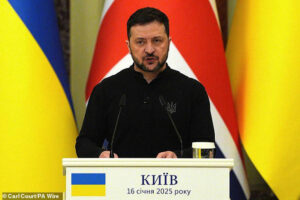
Volodymyr Zelensky has insisted that Ukraine will never recognise occupied Ukrainian territories as being part of Russia
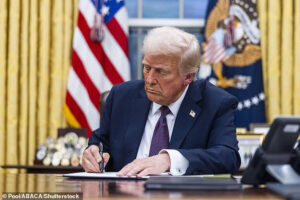
Donald Trump, who took office for a second term on Monday, has said he could end the war swiftly, without specifying how
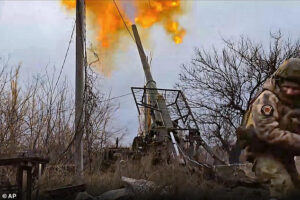
A Russian soldier fires a self-propelled gun
‘It’s therefore important to understand with what and whom we will have to deal, how best to build relations with Washington, how best to maximise opportunities and minimise risks,’ he said, speaking at the Institute for US and Canadian Studies, a think-tank in Moscow.
Trump warned on Tuesday that he would likely impose more sanctions on Russia if President Vladimir Putin refused to negotiate to end the nearly three-year-old conflict.
He gave no details on the possible additional sanctions on Russia, which is already under significant Western sanctions over the war.
The new president also issued a blow to the Kremlin on Tuesday, accusing Putin of ‘destroying Russia‘ with his failed war as he urged him to ‘make a deal’ to end the conflict.
‘He has to make a deal. I think he is destroying Russia by not making a deal,’ Trump said in a stark warning to the dictator.
‘I think Russia is going to be in big trouble,’ he added, saying that Putin ‘can’t be thrilled that he’s not doing so well.’
‘I mean, he works hard, but most people thought the war would be over in about a week, and now it’s been three years, right?’
The Russian economy was sinking, he went on, with inflation a major threat.
Putin, 72, earlier said he was ready to engage with Trump but still insisted on an outcome favouring Russia.
‘We are open to dialogue with the new US administration on the Ukrainian conflict. The most important thing here is to eliminate the root causes of the crisis,’ said the Russian ruler. An initial phone call is expected by Moscow to take place soon.
Trump said Zelensky was ready for a deal to halt the debilitating conflict, and the 78-year-old US leader said he planned to meet Putin with whom he had a ‘great relationship’ during his first term.
‘We’re going to try to do it as quickly as possible. You know, the war between Russia and Ukraine should never have started.’
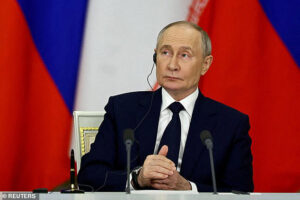
Trump warned on Tuesday that he would likely impose more sanctions on Russia if President Vladimir Putin refused to negotiate to end the nearly three-year-old conflict
After months of Ukraine occupying parts of Russia’s Kursk region as it aims to improve its position in the event of talks, Zelensky stated that any dialogue could only go ahead with Kyiv in a position of strength.
‘Putin cannot be treated as legitimate in this situation. He has violated everything. He must understand his transgression,’ the Ukrainian president said today, adding that if Putin was ‘approached as an equal – that would be a loss for Ukraine.’
But, he said, his government’s top priority was to find a way to halt the war, which has claimed the lives of at least 43,000 Ukrainian soldiers, according to figures released by Ukraine in December.
‘We must find all possible ways to end the hot phase of the war. This is the number one issue,’ Zelensky said.
‘There can be many talks, but the main goal is to stop the active phase. This is the first guarantee of security.’
Russia has occupied Crimea since its 2014 invasion of the territory. Months later it took large parts of the Donbas region, launching a was under the guise of a separatist uprising.
Since the full-scale invasion in 2022, Russian forces have controlled large swathes of southern and eastern Ukraine.
Meanwhile, since a surprise attack in August, Kyiv’s forces occupy around 600 sq km of Russian territory.
Politics
Trump orders ‘blackout’ at CDC, FDA, NIH as agencies prepare for MAGA
Published
17 hours agoon
January 22, 2025By
Ekwutos Blog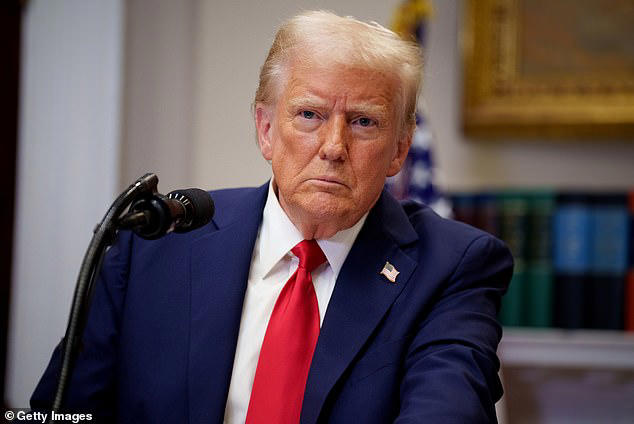
Donald Trump has ordered a communications blackout at America’s federal health agencies, according to reports.
The CDC, FDA, HHS and NIH have all been told to pause external communications, including publishing scientific reports, updating websites or issuing health advisories.
The directive came without warning, sources told the Washington Post, and with little guidance as to how long it may last.
The health agencies play a vital role in gathering and sharing critical information with the public, including on outbreaks of infectious diseases, raising the alarm over foodborne disease outbreaks and food recalls.
However, DailyMail.com received its automated weekly FDA recall email at 8am ET this morning.
It is not entirely unusual for incoming administrations to pause external communications temporarily, which may be done to help newly appointed officials understand the scope of information that is being released.
But some said that if the pause lasts longer than a week or two then it could be seen as concerning.
The new president, 78, singled out public health agencies in his inaugural address — saying that they ‘do not deliver in times of disaster’, referring to what many have seen as a mishandling of Covid messaging.
Robert F. Kennedy Junior has been nominated to head up the HHS, which has oversight over all the federal health agencies.
As part of his ‘Make America Healthy Again’ pledge, he has promised to overhaul the three agencies.
The communications blackout was issued by Stefanie Spear, a deputy chief of staff at HHS who joined the agency this week. She was also RFK Jr.’s press secretary during his presidential campaign.
The pause on external communications includes blocks on publishing scientific reports issued by the CDC, known as Morbidity and Mortality Weekly Reports (MMWR), advisories sent out to clinicians on the CDC’s health network, data updates to the CDC website, and public health data released from the National Center for Health Statistics, including on drug overdose deaths.
The CDC had been scheduled to publish several MMWR reports this week, sources familiar with the matter said, including three on the bird flu outbreak alarming scientists.
It was not clear whether the directive also blocked the agencies from sharing urgent communications, such as on drug approvals or novel disease outbreaks.
Dr Lucky Tran, a Democrat-leaning science communicator at Columbia University, blasted the order as the beginning of censorship.
Jeff Jarvis, a retired professor of journalism at City University New York, said: ‘This is terrible: Forced ignorance on health data.
‘Officials in sane and scientific states must band together to report data on their own. We need such shadow governments.’
The CDC publishes on average about 50 peer-reviewed articles per week, in addition to updating numerous datasets and other materials, while the FDA initiates more than 500 food recalls per year.
The CDC receives about $24.9billion in public funding every year, while the FDA costs $8.4billion and the NIH costs more than $47billion annually.
At the beginning of Trump’s first term, administration officials also asked public health agencies to cease communicating with the public it was reported at the time.
At that time, the limits appeared focused on agenices overseeing environmental and scientific policy, such as the Environmental Protection Agency.
Politics
Putin Hails Trump On Inauguration As US President For Second Time, Says Russia Willing To End War
Published
1 day agoon
January 22, 2025By
Ekwutos Blog
Russia President Vladimir Putin has congratulated Donald Trump as he is being inaugurated as the 47th President of the United States.
Putin on Monday, 20th of January 2025 revealed he was open to dialogue with the new U.S. administration on Ukraine and nuclear arms. He also indicated that Moscow was ready to discuss nuclear arms control and wider security issues.
In a video broadcast, Putin noted that he was interested in a long-lasting peace in Ukraine rather than a short-term ceasefire with the country.
He made the comments during the Russia’s Security Council meeting that was shown on state TV. According to him, “We see the statements by the newly elected president of the United States and members of his team about the desire to restore direct contacts with Russia,” said Putin.
“We also hear his statement about the need to do everything possible to prevent World War Three. We of course welcome this attitude and congratulate the elected president of the United States of America on taking office. “As for the resolution of the situation (in Ukraine) itself, I would like to emphasise that the goal should not be a brief ceasefire, not some kind of period of respite that would allow a regrouping and rearmament of forces, but a long-term peace based on respect for the legitimate interests of all people and all peoples who live in the region.”

Abia Govt Begins Major Crackdown On Street Trading, Road Obstructions In Aba

Globacom CEO Ahmad Farroukh resigns after one month amid governance challenges

Zelensky dampens hopes Trump could strike peace deal with Putin
Trending
- Politics11 months ago
Nigerian Senate passes Bill seeking the establishment of the South East Development Commission.

 Business11 months ago
Business11 months agoInflation hits record high of 29.90% on naira weakness

 Politics8 months ago
Politics8 months agoBREAKING: Federal Gov’t Offers To Pay Above N60,000, Reaches Agreement With Labour

 SportsNews11 months ago
SportsNews11 months agoOlympic Qualifiers 2024: CAF Confirms Dates For Super Falcons Vs Banyana Banyana

 Trending3 months ago
Trending3 months agoNYA demands release of ‘abducted’ Imo chairman, preaches good governance
- Business3 months ago
US court acquits Air Peace boss, slams Mayfield $4000 fine

 Politics11 months ago
Politics11 months agoGovernor Hope Uzodinma’s New Cabinet In Imo: The Gainers, The Losers

 Politics3 months ago
Politics3 months agoMexico’s new president causes concern just weeks before the US elections

